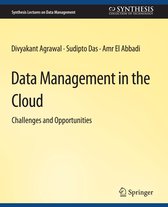Synthesis Lectures on Data Management- Principles of Database and SSDs Codesign
Afbeeldingen
Sla de afbeeldingen overArtikel vergelijken
Auteur:
Alberto Lerner
- Engels
- Hardcover
- 9783031578762
- 06 juli 2024
- 135 pagina's
Samenvatting
Such research aims at devising mechanisms and policies coupling the storage manager of database and SSD internals, e.g., placing an SSD FTL under the control of database, changing SSD sub-systems in response to the workload, or executing logic within an SSD on a database’s behalf.
This book offers a comprehensive resource on Solid-State Drives (SSD) as the field undergoes a radical evolution characterized by the incredible variety of SSD forms and their rapid diversification. It proposes a new classification system to help readers navigate the SSD landscape. For years, the evolution of SSDs was obscured by the unchanging abstractions of block devices and POSIX I/O, but it is apparent that these abstractions have become a problematic hinderance to performance and also fail to reduce software complexity. The book explores how such a state of affairs impacts the database community in at least two ways. First, it considers how using SSDs through legacy interfaces that hide internal mechanisms invariably results in erratic performance. While the blame often goes to the notoriously expensive garbage collection of SSDs, the authors argue that in truth, several other complex processes result in nonlinear effects on latency and bandwidth. The book describes these processes and how they are implemented in modern devices, knowledge that will help system designers better choose SSDs and shape database workloads to match their performance characteristics. Second, the book explores how the inadequacy of the traditional I/O abstractions opens up an entire research field focused on the co-design of database management systems and SSD. Such research aims at devising mechanisms and policies coupling the storage manager of database and SSD internals, e.g., placing an SSD FTL under the control of database, changing SSD sub-systems in response to the workload, or executing logic within an SSD on a database’s behalf. The book introduces these principles of DBMS/SSD co-design and argues that a more seamless integration of databases and storage solutions as well as the study of SSD variations adapted to database computations are central to the development of the next generation of database systems.
This book offers a comprehensive resource on Solid-State Drives (SSD) as the field undergoes a radical evolution characterized by the incredible variety of SSD forms and their rapid diversification. It proposes a new classification system to help readers navigate the SSD landscape. For years, the evolution of SSDs was obscured by the unchanging abstractions of block devices and POSIX I/O, but it is apparent that these abstractions have become a problematic hinderance to performance and also fail to reduce software complexity. The book explores how such a state of affairs impacts the database community in at least two ways. First, it considers how using SSDs through legacy interfaces that hide internal mechanisms invariably results in erratic performance. While the blame often goes to the notoriously expensive garbage collection of SSDs, the authors argue that in truth, several other complex processes result in nonlinear effects on latency and bandwidth. The book describes these processes and how they are implemented in modern devices, knowledge that will help system designers better choose SSDs and shape database workloads to match their performance characteristics. Second, the book explores how the inadequacy of the traditional I/O abstractions opens up an entire research field focused on the co-design of database management systems and SSD. Such research aims at devising mechanisms and policies coupling the storage manager of database and SSD internals, e.g., placing an SSD FTL under the control of database, changing SSD sub-systems in response to the workload, or executing logic within an SSD on a database’s behalf. The book introduces these principles of DBMS/SSD co-design and argues that a more seamless integration of databases and storage solutions as well as the study of SSD variations adapted to database computations are central to the development of the next generation of database systems.
This book offers a comprehensive resource on Solid-State Drives (SSD) as the field undergoes a radical evolution characterized by the incredible variety of SSD forms and their rapid diversification. It proposes a new classification system to help readers navigate the SSD landscape. For years, the evolution of SSDs was obscured by the unchanging abstractions of block devices and POSIX I/O, but it is apparent that these abstractions have become a problematic hinderance to performance and also fail to reduce software complexity. The book explores how such a state of affairs impacts the database community in at least two ways. First, it considers how using SSDs through legacy interfaces that hide internal mechanisms invariably results in erratic performance. While the blame often goes to the notoriously expensive garbage collection of SSDs, the authors argue that in truth, several other complex processes result in nonlinear effects on latency and bandwidth. The book describes these processes and how they are implemented in modern devices, knowledge that will help system designers better choose SSDs and shape database workloads to match their performance characteristics. Second, the book explores how the inadequacy of the traditional I/O abstractions opens up an entire research field focused on the co-design of database management systems and SSD. Such research aims at devising mechanisms and policies coupling the storage manager of database and SSD internals, e.g., placing an SSD FTL under the control of database, changing SSD sub-systems in response to the workload, or executing logic within an SSD on a database’s behalf. The book introduces these principles of DBMS/SSD co-design and argues that a more seamless integration of databases and storage solutions as well as the study of SSD variations adapted to database computations are central to the development of the next generation of database systems.
This book offers a comprehensive resource on Solid-State Drives (SSD) as the field undergoes a radical evolution characterized by the incredible variety of SSD forms and their rapid diversification. It proposes a new classification system to help readers navigate the SSD landscape. For years, the evolution of SSDs was obscured by the unchanging abstractions of block devices and POSIX I/O, but it is apparent that these abstractions have become a problematic hinderance to performance and also fail to reduce software complexity. The book explores how such a state of affairs impacts the database community in at least two ways. First, it considers how using SSDs through legacy interfaces that hide internal mechanisms invariably results in erratic performance. While the blame often goes to the notoriously expensive garbage collection of SSDs, the authors argue that in truth, several other complex processes result in nonlinear effects on latency and bandwidth. The book describes these processes and how they are implemented in modern devices, knowledge that will help system designers better choose SSDs and shape database workloads to match their performance characteristics. Second, the book explores how the inadequacy of the traditional I/O abstractions opens up an entire research field focused on the co-design of database management systems and SSD. Such research aims at devising mechanisms and policies coupling the storage manager of database and SSD internals, e.g., placing an SSD FTL under the control of database, changing SSD sub-systems in response to the workload, or executing logic within an SSD on a database’s behalf. The book introduces these principles of DBMS/SSD co-design and argues that a more seamless integration of databases and storage solutions as well as the study of SSD variations adapted to database computations are central to the development of the next generation of database systems.
Productspecificaties
Wij vonden geen specificaties voor jouw zoekopdracht '{SEARCH}'.
Inhoud
- Taal
- en
- Bindwijze
- Hardcover
- Oorspronkelijke releasedatum
- 06 juli 2024
- Aantal pagina's
- 135
Betrokkenen
- Hoofdauteur
- Alberto Lerner
- Hoofduitgeverij
- Springer International Publishing Ag
Overige kenmerken
- Product breedte
- 168 mm
- Product lengte
- 240 mm
- Verpakking breedte
- 168 mm
- Verpakking lengte
- 240 mm
EAN
- EAN
- 9783031578762
Je vindt dit artikel in
- Boek, ebook of luisterboek?
- Boek
- Taal
- Engels
- Beschikbaarheid
- Te reserveren
- Studieboek of algemeen
- Studieboeken
Kies gewenste uitvoering
Bindwijze
: Hardcover
Prijsinformatie en bestellen
De prijs van dit product is 47 euro en 99 cent.
Nog niet verschenen - reserveer een exemplaar
Beschikbaar op 06-07-2024
Verkoop door bol
- Prijs inclusief verzendkosten, verstuurd door bol
- Ophalen bij een bol afhaalpunt mogelijk
- 30 dagen bedenktijd en gratis retourneren
- Dag en nacht klantenservice
Rapporteer dit artikel
Je wilt melding doen van illegale inhoud over dit artikel:
- Ik wil melding doen als klant
- Ik wil melding doen als autoriteit of trusted flagger
- Ik wil melding doen als partner
- Ik wil melding doen als merkhouder
Geen klant, autoriteit, trusted flagger, merkhouder of partner? Gebruik dan onderstaande link om melding te doen.








